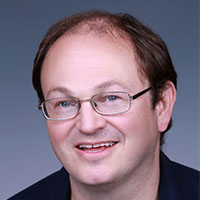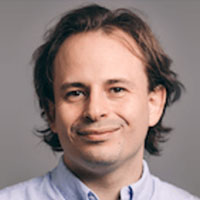Quantum Computing Bootcamp 2021
Lecture Series about Quantum Computing at PNNL
This lecture series has ended, but stay tuned for future Bootcamps.
The Physical and Computational Sciences Directorate (PCSD) held its first Quantum Computing Bootcamp, a series of 10 lectures that covered fundamental topics in quantum computing. This virtual bootcamp was intended to provide a jumpstart for PNNL researchers and interns interested in becoming involved in quantum computing research.
The bootcamp was open to all staff and interns at PNNL. It was held two days per week on Tuesdays and Fridays, from 3–4:30 p.m., via Microsoft Teams.
Each lecture was 60 minutes, followed by an extended discussion of 30 minutes to allow time for questions and for reviewing homework assignments. The first lecture was July 20 and the last lecture was August 20, with each session building on the one before it.
We had an outstanding lineup of speakers for this bootcamp. Tobias Hagge introduced quantum computing and axioms, followed by in-depth discussions from Hagge and Carlos Ortiz Marrero on circuits and algorithms. The series ended with two lectures by Nathan Wiebe on real-world quantum applications.
Organizing Committee
- Nathan Baker
- Tobias Hagge
- Joseph Williams
Speakers
 | Tobias Hagge is a mathematician in PCSD at PNNL, focusing on pure mathematics in applied contexts and machine learning for physical systems. He is currently using combinatorics and algebra to optimize quantum circuits as part of the Quantum Science Center, exploring algebra-based network topologies for high-performance computing as part of the Advanced Data Analytics for Proliferation Detection (ADAPD) program, applying mixed-integer programming methods to analyze deep learning network behavior, and applying advanced data analytics to proliferation detection efforts as part of ADAPD. Hagge received a PhD in mathematics from Indiana University. |
 | Carlos Ortiz Marrero is a data scientist in the National Security Directorate at PNNL and holds a joint appointment with North Carolina State University’s College of Engineering. He is currently working on problems related to machine learning, quantum computing, and graph theory. Ortiz Marrero received a PhD in mathematics from the University of Houston. |
 | Nathan Wiebe is a physicist in PCSD at PNNL and holds a joint appointment with the University of Toronto’s Department of Computer Science. Wiebe is a researcher in quantum computing who focuses on quantum methods for machine learning and simulation of physical systems. His work has provided the first quantum algorithms for deep learning, least squares fitting, quantum simulations using linear-combinations of unitaries, quantum Hamiltonian learning, near-optimal simulation of time-dependent physical systems, and efficient Bayesian phase estimation, as well as pioneered the use of particle filters for characterizing quantum devices. Wiebe's work has made many other contributions ranging from the foundations of thermodynamics to adiabatic quantum computing and quantum chemistry simulation. Wiebe received his PhD from the University of Calgary studying quantum computing. |
Bootcamp Sessions
July 20, 2021
LECTURE 1: Introduction to Quantum Computing
Tobias Hagge, mathematician
- What is quantum computing?
- Basics of quantum computing (the basic axioms)
- How is quantum computing different from “classical” computing?
- Measurement
- Quantum complexity
July 23, 2021
Lecture 2: MULTI-QUBIT SYSTEMS
Tobias Hagge, mathematician
- The axioms, revisited
- Walk through multi-qubit systems
- Operations and measurement
- Universality
July 27, 2021
Lecture 3: USEFUL QUANTUM CIRCUITS
Carlos Ortiz Marrero, data scientist
- How to implement a truth table
- Rotate, compute, rotate
- Hadamard test
- Phase kickback
- Swap test
July 30, 2021
Lecture 4: ALGORITHMS AND PERFORMANCE
Carlos Ortiz Marrero, data scientist
- Quantum oracles
- Deutsch-Jozsa algorithm
- Introduction to query complexity
- Simon's algorithm
August 3, 2021
Lecture 5: AMPLITUDE AMPLIFICATION
Carlos Ortiz Marrero, data scientist
- Grover's algorithm
- Discussion and analysis
August 6, 2021
Lecture 6: PHASE ESTIMATION
Tobias Hagge, mathematician
- Quantum Fourier transform
- Quantum phase estimation
August 10, 2021
Lecture 7: QUANTUM SIMULATION: LINEAR COMBINATIONS OF UNITARIES
Nathan Wiebe, physicist
- Theory
- Applications
August 13, 2021
Lecture 8: QUANTUM SIMULATION: TROTTERIZATION
Tobias Hagge, mathematician
- Compilation problem
- Exponentiation of a gate/matrix
- Trotter-Suzuki decomposition
August 17, 2021
Lecture 9: REAL-WORLD QUANTUM I
Nathan Wiebe, physicist
- Quantum Singular Value Transformation
- Qubitization
August 20, 2021
Lecture 10: REAL-WORLD QUANTUM II
Nathan Wiebe, physicist
- Error-correcting codes (Shor's code)
- Discussion and conclusion